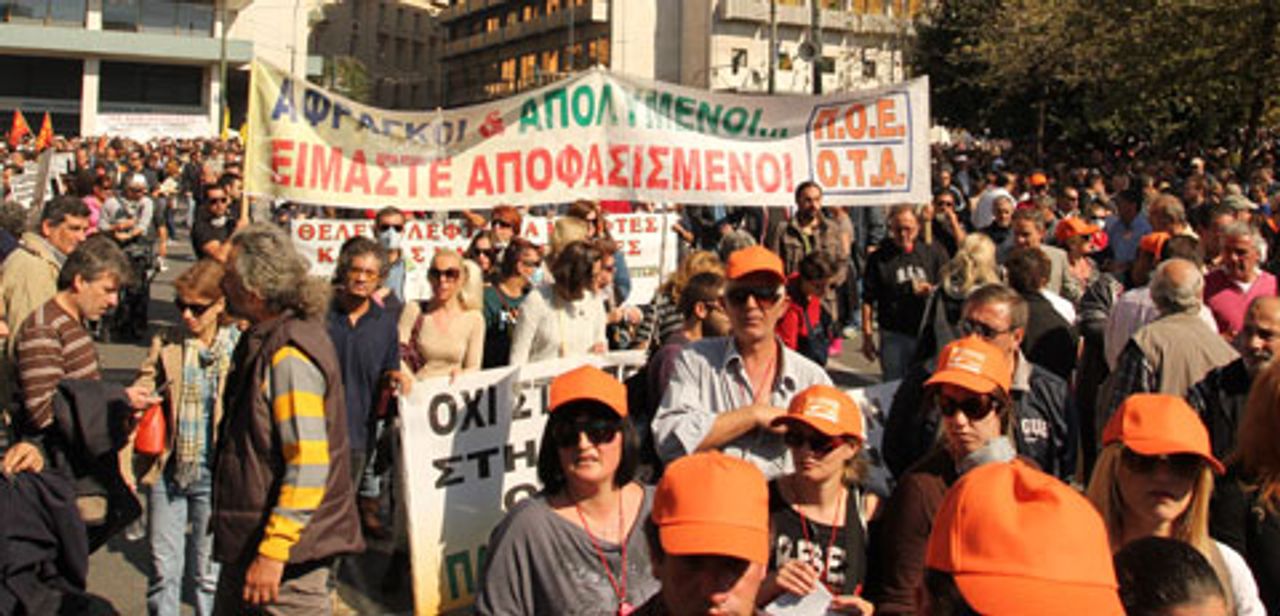 Demonstrators make their way to the parliament building
Demonstrators make their way to the parliament buildingIn the face of massive popular opposition, the Greek social democratic PASOK government has given final approval to a new, brutal austerity programme.
The bill was supported yesterday evening by the votes of 153 deputies to 144. It had already been given preliminary approval in a first vote, Wednesday by a margin of 154-141 of the 300 parliamentary deputies.
The government of Prime Minister George Papandreou insisted this week that the passage of the legislation was integral to Greece being able to remain in the European Union and to hold further upcoming negotiations with the “troika” (European Union, International Monetary Fund and European Central Bank) regarding its sovereign debt crisis.
 Workers protest at the Greek parliament in Syntagma Square
Workers protest at the Greek parliament in Syntagma SquareFinance Minister Evangelos Venizelos told parliament before the vote, “You have to approve the law, with all its clauses. This is not a game. If anybody thinks they can test how much wriggle-room we have, they’re mistaken.”
As the vote was being passed, Papandreou was set to travel to Brussels ahead of a meeting of European leaders Sunday that is to propose measures to tackle the sovereign debt crisis.
Much media coverage prior to the debate had focused on the PASOK “rebel deputies”; supposedly opposed to the deepening of austerity being imposed by the government in agreement with the troika. One of this tiny number, Vaso Papandreou, blustered, “I am struggling with my conscience,” adding, “Enough is enough, society is despairing, the country is collapsing.”
Despite such rhetoric Vaso made clear she would vote for the government yet again.
In the end, just one PASOK MP, Louka Katseli, voted against the bill as she did not support Article 37 suspending collective bargaining in the private sector. Katseli had previously voted in favour of the overall new austerity law. For opposing one element of the bill, she was immediately expelled from the parliamentary group.
The sovereign debt crisis ravaging Greece continues to escalate. It is estimated that by the end of 2012, the total debt owed by Greece to the international banks will reach €370 billion. The government stated earlier this month that without the next tranche of €8 billion, from the €110 billion loan package agreed in May 2010, Greece will go bankrupt.
As the deputies prepared to pass the austerity bill, a draft report from the EU’s recent mission to Athens was leaked recommending the loan payment is made, despite describing Greece’s debt levels as “extremely worrying,” said Reuters. The EU stated that the Greek government was unable to meet its debt reduction targets in 2011, but on the basis of new austerity measures it would be able to do so in 2012. “Government debt dynamics remain extremely worrying”, the draft warns and added that debt levels would stay very high “for many years and would be vulnerable to adverse shocks.”
The money should be released, “as soon as the agreed prior actions on fiscal consolidation, privatisation and labour market reform, which were announced by the government, have been legislated.”
Despite the recommendation, it is not certain that the loan will be forthcoming. Kathemerimi said the report “was prepared in coordination with the European Central Bank but not with the International Monetary Fund, the other member of the troika, which is preparing a separate report.”
Last month the credit ratings of eight Greek banks were downgraded by two notches by the Moody’s credit ratings agency. Dutch European Central Bank governing council member Klaas Knot, in an interview with Het Financieele Dagblad, said, “I had long been convinced that a default was not necessary. But the news from Athens is sometimes not encouraging. All efforts are aimed at preventing it, but I am now less certain in ruling out a default than I was a couple of months ago”.
Knot is the first eurozone central banker to warn outright that the country may soon become bankrupt.
While the institutions of global finance capital continue to plot with PASOK to impose a social counter-revolution against Greece’s workers, this is provoking dangerous levels of social opposition. It passed the latest assault on the jobs, wages and conditions of the working class hidden in the parliament chamber behind the massed ranks of 15,000 riot police.
Terrified of workers striking in their millions in a mass rejection of their policies, on Wednesday evening the government moved to end by force the 17-day strike by refuse workers in Athens. The previous day, the government began issuing Civil Mobilisation Orders to the striking workers. According to reports, some 7,000 orders were expected to be issued by Thursday. Based on a law that goes back to World War II, the order allows for the compulsory provision of services. Striking workers are effectively conscripted into the army, with instructions to either to return to work immediately or face imprisonment for up to five years.
Themis Balasopoulos, the president of POE-OTA, the federation of municipal workers’ union, has made no statement opposing the dictatorial move by the government. Instead he told the media yesterday that the sanitation workers had yet to receive the civil mobilization orders. Kathemerimi said of his TV appearance that Balasopoulos believed the removal of the garbage may take up to a week and “his assessment was based on sanitation workers schedules.”
Balasopoulos was concerned, Kathemerimi said, “that the collection would be feasible provided that vehicles had enough fuel, given the ongoing strike by customs officials.”
The trade unions complied with a previous order in July, ending a six-day strike by truck drivers that caused major fuel shortages. As the government issued the orders against the truckers, their union president, Georgios Tzortzatos, said, “We are now soldiers of the Greek state and we’ll wait to see our orders.”
While the Greek working class is being forced to bear the burden of the economic crisis, the ruling elite is moving rapidly to protect their vast wealth. On Wednesday it was reported that more than €228 billion had been moved from debt-ridden Greek financial institutions to accounts in Switzerland.
The British Daily Mail reported that “rich Greeks fear the possible re-introduction of their old currency, the drachma, would instantly halve the value of their euros if they are left in Greek banks.”
